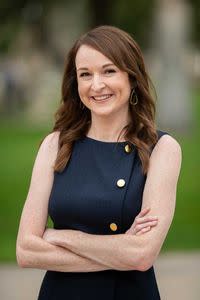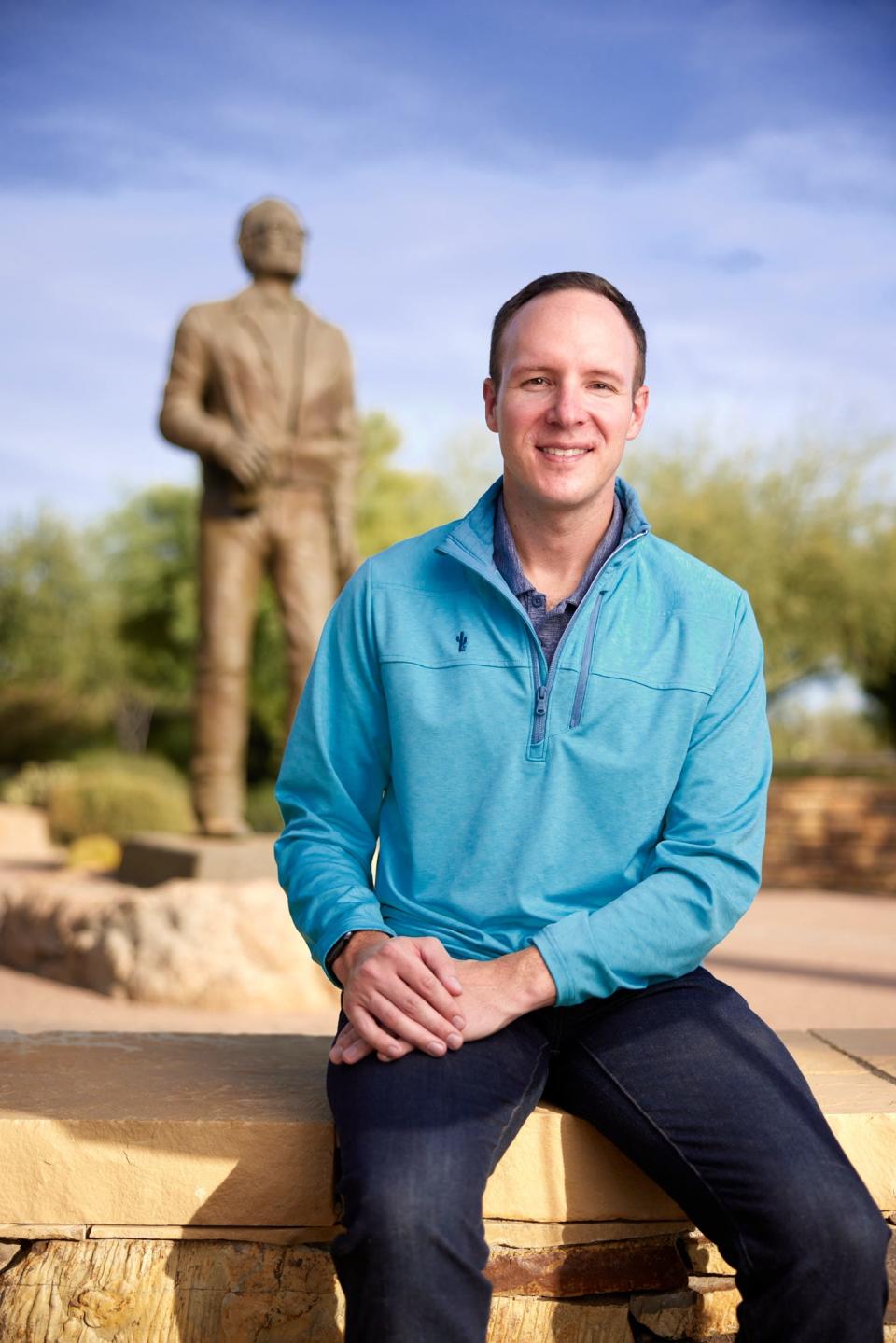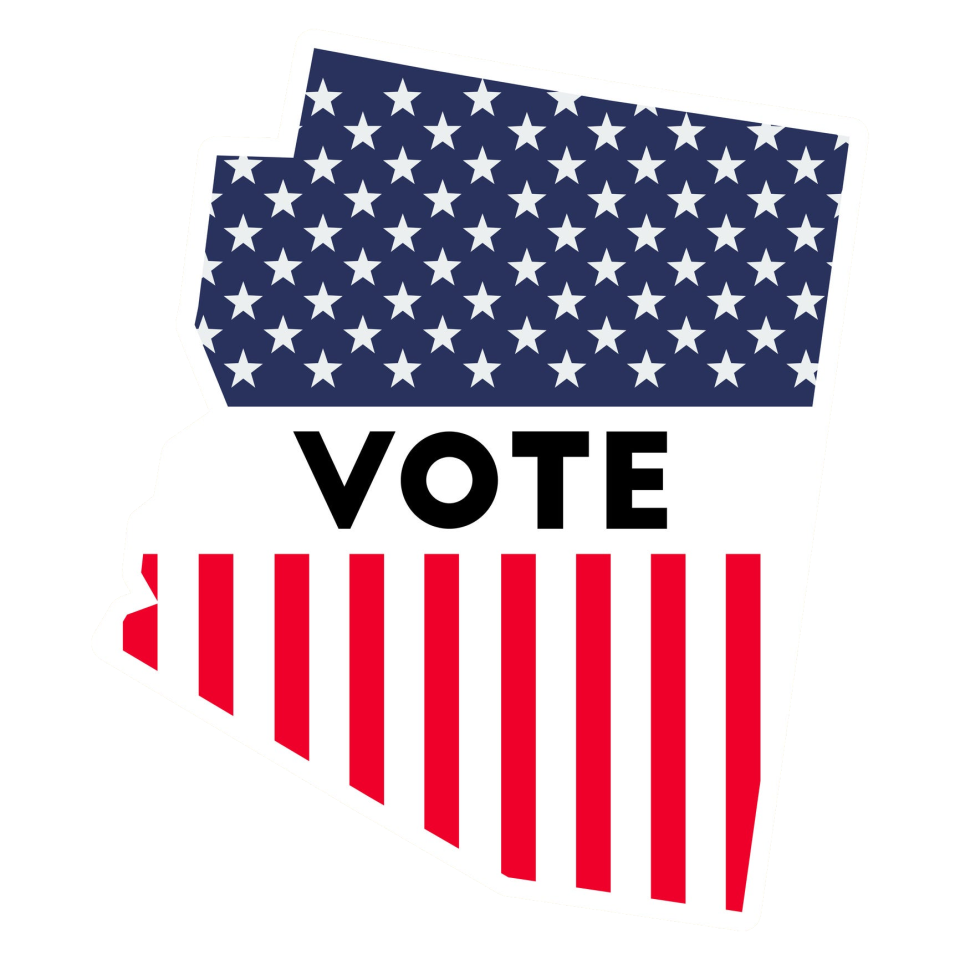Where Arizona House candidates Matt Gress and Laura Terech stand on key issues for District 4
- Oops!Something went wrong.Please try again later.
Voters have until Nov. 8 to choose who will fill the 60 open seats in Arizona's House of Representatives, where election winners will go on to craft policies around issues ranging from voting rights to abortion over the next two years.
In Paradise Valley and north Phoenix's highly competitive Legislative District 4, three candidates are vying for two open House seats. Among them are two Republicans — state budget chief Matt Gress and former state lawmaker Maria Syms — and Democratic challenger Laura Terech.
Terech and Gress have both worked as teachers and their policy goals include public school reform, although they have some vastly different views about how the state's education system should operate.
Syms currently serves as one of Arizona's assistant attorney generals. She held a state House seat from 2017 to 2019, and was a Town Councilmember in Paradise Valley.
Residents must register to vote by Oct. 11 and can check their registration status on the Arizona Secretary of State’s website. Those who vote by mail should send in their ballot by Nov. 1 or drop it off at a voting location by 7 p.m. on Election Day, Nov. 8.
The Arizona Republic asked the House candidates of Legislative District 4 to share their views on key state issues to help voters decide whom to elect. Syms did not provide answers after repeated requests.
Top priorities
If you are elected, what will be your top priority while in office, and what would you do about it?

Terech (D): My top priority will be to ensure that our public schools receive the support our children deserve. This will take better-designed state budgets, but I know we can do better than sitting near the bottom in nearly every education funding metric.
Gress (R): Through August 2022, inflation in Phoenix has increased at a record 13%. Higher gas, grocery and housing prices are devastating Arizonans. Household incomes are not keeping up with the cost of living and the federal government is making things worse with more borrow, tax and spend programs.
As the state’s top budget chief, I’ve helped pass balanced budgets and maintain fiscal discipline. I’ll work with Republicans and Democrats to run the government responsibly, keep taxes and regulations low and allow Arizona families to keep more of their hard-earned money.
Education
Public schools received a $1 billion budget increase this year that's expected to raise Arizona’s ranking from 48th to 45th in per-pupil spending. How do you see the level of current public-school funding in Arizona: Too little, too much or about right? Should the Aggregate Expenditure Limit be raised, allowing schools to spend the extra money?

Terech (D): I believe this is a good start, but more must be done to address Arizona’s education funding crisis. Our teachers remain amongst the lowest paid in the nation and nearly one-third of students lack a permanent qualified teacher. We need to raise the AEL so that schools are able to spend all of the money given to them.
Gress (R): In recent years, the state has significantly increased K-12 per pupil spending at the fastest rate in modern Arizona history. We’ll need to raise the Aggregate Expenditure Limit to allow schools to spend these new dollars.
I also support targeted funding increases for K-12 education and much greater financial transparency in school budgets. That’s why I plan to introduce the “Pay Teachers First” Plan to give every Arizona public school teacher a $10,000 raise — with 100% of the new state dollars going directly to the teachers, rather than bureaucracy, and significantly boosting starting teacher pay.
Do you support the school voucher expansion that passed this year and would you seek to modify it?
Terech (D): I do not support universal voucher expansion. I am supportive of the effort by Save Our Schools to refer this measure to the ballot so that the voters can have a say.
Gress (R): I am a strong supporter of school choice, including Empowerment Scholarship Accounts. We need more learning options for parents and kids. Families should get to decide where and how their kids learn. No two kids are the same. They have different interests, different learning patterns, and different needs, each of which contributes to their success in education.
Arizona’s educational landscape encourages innovation and advances the guiding principle that a family’s wealth must never dictate what educational opportunities are available to them.
Elections and voting rules
Do you think there are significant problems with the state’s election system and, if so, what are they and how would you try to fix them?
Terech (D): In Arizona, our elections are safe and secure. The many conspiracy theories surrounding the 2020 election are false and even dangerous to democracy.
Gress (R): Fundamental to protecting our democracy is the high degree of confidence that voters must have in our elections. In the statehouse, I’ll ensure the secretary of state and counties have the resources they need to properly conduct elections: voting machines, staffing, cybersecurity tools, etc.
Do you support mail-in voting?
Terech (D): I support mail-in voting, and, like 80% of Arizona voters, choose to vote that way myself.
Gress (R): Yes, and I’m also supportive of additional identity verification measures to strengthen security of mail-in ballots.
Do you believe that the Legislature has plenary power, or should obtain the power, to overturn elections?
Terech (D): I do not. Elections should be decided by the voters, not the Legislature.
Gress (R): The certification process that exists by county and by attorney general, secretary of state, and governor seems to be a sufficient check. Additionally, the courts can also review any legal action brought against election results.
Water resource management
What should the state Legislature do to best manage future cuts to the CAP water supply and the possibility that the drought may not end or get worse?
Terech (D): Our state must work to find more ways to conserve water and ensure that corporations are not able to pump unlimited amounts of our state’s limited groundwater.
Gress (R): As a legislator, I would strive to be a bipartisan problem-solver. Our policies should ensure Arizona remains a great place for people and industry for generations to come.
Arizona uses slightly less water than in 1950 and recycles 90% of its wastewater. Our water code, Title 45, is one of the best in the world. We can conserve more water through investments in technology, like field drip irrigation and canal lining. We also must address water procurement. There is not enough water to go around — that’s not an economic win. To solve this issue, desalination must be seriously considered.
Social issues and immigration
Are there particular cultural issues you would feel compelled to take a stand on — i.e., abortion, LGBTQ, critical race theory, or corporate environmental, social and governance measures — and what would be your position on them? How would you balance personal freedoms with your stance on these issues?
Terech (D): I strongly support access to abortion and making sure that people are able to make their own reproductive healthcare decisions without government interference. I am a strong supporter of LGBTQ rights.
Gress (R): As a legislator, my foremost responsibility is to listen to and work for my constituents; as their representative, I will follow through on my promise and will approach each conversation with an open-mind. All of these issues must be approached seriously and carefully because so much is at stake for the future of our state. There are some extreme and troubling views on these matters that do not reflect the views of most Arizonans. I intend to use common sense and do the right thing for our state.
What, if anything, should the Legislature do to address immigration and border issues?
Terech (D): I’m in favor of strong borders. We can and should implement effective and efficient solutions such as more enforcement personnel and investment in drones.
Gress (R): Arizona’s border is in crisis. Border security impacts every other issue in Arizona, and directly impacts our safety and quality of life. A record number of illegal crossings and drugs are flowing into our state. Arizona is on the frontlines, and the state must take action.
We’ve already started that effort in this year’s budget, which included over half a billion dollars for border security and law enforcement efforts. In the statehouse, I’ll advocate more funding for these border programs and tougher penalties to crack down on the cartels and smugglers who are abusing our laws.

Election guide: November 2022
City races | School boards | State | Governor
| Ballot measures | Federal races | How to vote
Economy, state spending
Do you think the Legislature should try to help ease inflation in Arizona, (metro Phoenix’s inflation rate is No. 1 in the country), and how should lawmakers do that?
Terech (D): Our Legislature should try to help ease inflation. We should strengthen our state-level earned income tax credit to help working families.
Gress (R): I’ll work with Republicans and Democrats to put Arizona families first when it comes to addressing inflation. That starts by ensuring our state government does not ask taxpayers for even more of their income. The goal is to balance our budgets with what we have. Running government responsibility and creating a tax and regulatory environment that supports economic growth and prosperity will be my goals in the Legislature.
The Legislature should work with industry-specific stakeholders, like housing, to help lower costs for Arizonans. Addressing supply chain and water issues will enable homebuilders to produce more homes and lower housing costs.
State revenues produced an estimated $5 billion surplus this year. If the trend toward budget surpluses continues, what would you do with the surplus funds?
Terech (D): Although there are many programs left underfunded by our Legislature, one of many avenues we must pursue is expanding access to KidsCare, our state’s health insurance program for children in poverty.
Gress (R): The largest priority of any Legislature must always be education. It receives the majority of state funding and reflects that value we place on our future. The primary effort in my first term will be to focus school budgets on teacher salaries. The “Pay Teachers First” plan that will give every Arizona public school teacher a $10,000 raise will significantly help.
Public safety is another baseline investment that should be top of mind for any legislator. We cannot have prosperity without public safety. Finally, the state should continue pressing forward on infrastructure: roads, bridges, broadband or water security projects.
Reach Sam at sam.kmack@arizonarepublic.com. Follow him on Twitter @KmackSam.
Support local journalism. Subscribe to azcentral.com today.
This article originally appeared on Arizona Republic: Arizona House District 4: Matt Gress and Laura Terech on top issues

